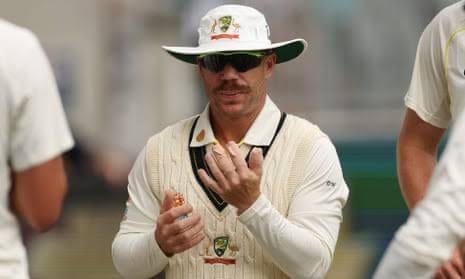In the spirit of the holiday season and in recognition of his outstanding contribution to the game of cricket, and on the occasion of his 100th Test match, it is only right and proper that the global game raises a fist of recognition to David Warner and lets go of lingering antagonism, if there is any.
He should be cut free from the hanging chains of his lifetime leadership ban and set free to enjoy the last few years of his professional career, unhindered from any official sanction. Whether he deserves it or not, his family certainly do and cricket – in Australia and beyond - will be far better served in the long run with one of its finest performers more celebrated than denigrated.
Cricket Australia has come in for some fearful criticism about dragging their oversized corporate feet in dealing with many issues, most recently Warner’s attempt to have his life-time leadership ban rescinded. The organisation has stumbled through dozens of blunders for decades, often accused along the way of being biased, blinkered or compromised in its judgements and ‘sentencing’.
Now, having effectively given itself the option of outsourcing its ‘Code of Conduct and Ethics’ division to independent experts in the field to avoid accusations of vested interests, it is again being lashed for its incompetence.
The experts decided, reasonably, that if they were to approve the overturning of the ban they would need to investigate the sincerity of Warner’s contrition and remorse. Which would necessitate revisiting the events of the Newlands Test match. Which is understandable. For people not expressly engaged in the sport. At international level.
Warner understood the implication of his suggestion that his refusal to agree to such a condition was in order to ‘protect’ his teammates. Protecting his wife and children from the scorn of further public scrutiny is both right and laudable but refusing “to be the washing machine for cricket’s laundry”, which he was involved in soiling, is an oddly advised comment.
A lifetime ban from, or for, anything is unusual. A sporting misdemeanour hardly seems serious enough for a lifetime ban, especially without physical harm. Is talk of ‘remorse’ and ‘contrition’ relevant? Warner’s reform, it seems, extends no further than keeping his mouth shut for the last five years. But his silence and reformed behaviour is a separate issue to the sandpaper one.
International cricketers have used a host of methods to change the condition of the ball, many of which were hilarious in their brazenness and skulduggery. Resin, used to harden horse’s hooves, applied to human thumb-nails and sharpened like a kitchen knife…yes, seriously. And more besides. The moral outrage over sandpaper was a distinctly disproportionate over-reaction pertaining uniquely to cricket. And, probably, to Warner.
There is a perception that Warner was guilty of constant swearing, volleying away at the opposition with a stream of ‘f’ and ‘c’ words. It is inaccurate and unfair because, while that would have been tiresome, it would also have been largely harmless. But for years he was nastier and more calculating than that.
In many cases his comments were both researched and rehearsed, not the result of ‘heat of the moment’ adrenalin surges or spontaneous chirps. He identified specific potential ‘weaknesses’ in vulnerable members of the opposition, especially young and inexperienced (older debutants were a favourite target) and he hit his targets more often than not. One player, who finished an otherwise inauspicious series against Australia with a century, recalls, with a laugh: “It should be one of the best memories of my short career – but all I can remember now is Warner, over and over again. And it wasn’t nice.”
Having fought with such detemination, and success, for so much of his career to stake an exclusive claim to cricket’s moral low-ground, it has been peculiar for those outside of Australian cricket watching Warner making a strident, last-ditch grasp for at least a share of the moral high ground.
But he should have his space there now. A fabulous cricketer who provided enormous energy and entertainment and, as John McEnroe did for tennis, widened the viewership and entrenched the loyalists, even if they disapproved of his behaviour. There will, naturally, be those amongst his foe who may require a little longer to acquiesce to the new mood. But to those of us who rely on the game for both entertainment and a living, we owe thanks to pitbulls like David Warner. He deserves, and the game deserves, to see him finish his Test career with a flourish at the MCG.






Once a cheat always a cheater. He has never apologized to the SA public! The ball tampering started in Durban with Stark swinging the ball prodigiously. They were all guilty
As a former league cricketer what I can not understand is how the bowlers in the team can claim they were not aware of what was happening. A bowler looks at the ball every time before he bowls a ball and would surely have noticed and changes in it. Especially if the ball simply went through to the keeper. In my opinion Warner and Smith have not been honest and deserve their punishment.